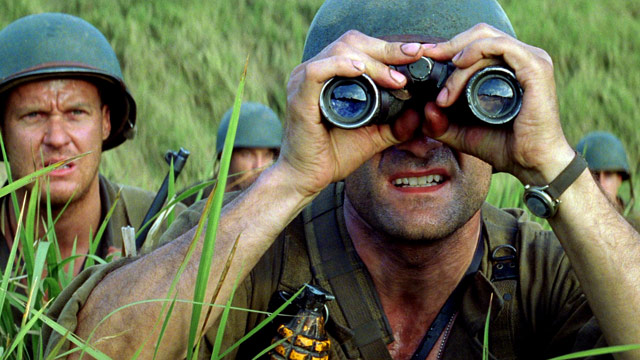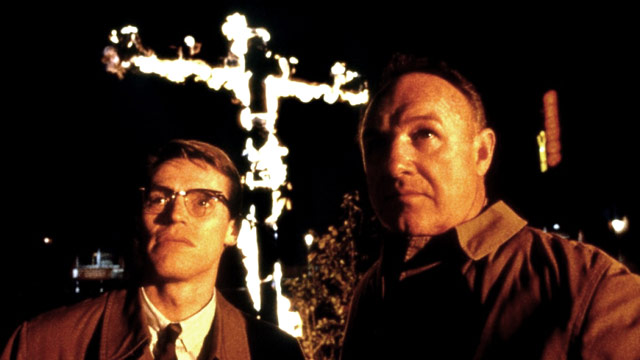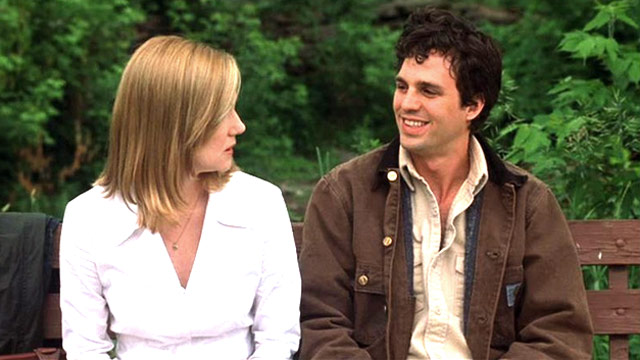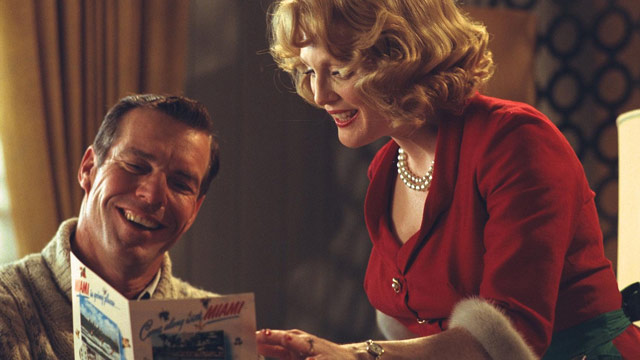
The Academy must’ve not been in a fightin’ mood in 1999, as Shakespeare in Love took the Oscar for Best Picture over two extraordinary yet extremely different (and polarizing) portraits of World War II: Steven Spielberg’s Saving Private Ryan and Terrence Malick‘s The Thin Red Line; while Ryan definitely gets the populist vote, Malick fans feel the return of the director of Badlands and Days of Heaven after a 20-year hiatus was reason enough for a gold statue. Malick interprets WWII as a dreamlike tone poem (one with an all-star cast); indeed, The Thin Red Line is more of a meditation than a narrative, something to be experienced rather than simply “watched” — which makes it both hypnotic and maddening, sometimes at the same time. The film is gorgeous, filled with startling images of the beauty (and anger) of nature vs. the ravages of man-made war, and the ensemble cast does terrific work, especially Nick Nolte as a gruff career soldier and Elias Koteas as an officer perhaps too humanistic for this harsh world — though special mention must be made of Jim Caviezel, whose melancholy, rebellious Private Witt provides the movie’s heart and soul. If the Oscars exist to acknowledge innovation, creativity and pushing the boundaries of what cinema is and what it can do, then The Thin Red Line definitely should’ve triumphed over a Gwyneth Paltrow Miramax movie.

Of course Rain Man was going to win the Best Picture Oscar in 1989 over Mississippi Burning; the Academy is certainly going to prefer the touching story of an autistic man and his hotshot younger brother over a difficult and often brutal depiction of Southern racism. Set in 1964 and loosely based on a real-life case, Mississippi Burning stars Gene Hackman and Willem Dafoe as two FBI agents sent to investigate the murders of three civil rights workers in rural Jessup County, where they’re hindered by a corrupt mayor and sheriff’s department with links to the Ku Klux Klan; Hackman’s experience as a former Southern sheriff gives them the edge they need as they bend and nearly break the law in order to see justice served. Alan Parker’s unrelentingly grim film is sometimes difficult to watch and probably doesn’t appear on many “Favorite Movies” lists, but it’s definitely the more “relevant” piece of work as compared to Barry Levinson’s well-acted yet ultimately lightweight crowd-pleaser. Nominated for seven Academy Awards, including Best Actor for Hackman and Best Supporting Actress for Frances McDormand as the sheriff’s abused wife, but only took home Best Cinematography.

Julia Roberts took home the Oscar for Best Actress in 2001 for her charming and completely unchallenging performance in Steven Soderbergh’s no-brainer crowd-pleaser, Erin Brockovich, but Laura Linney gave a much more nuanced and impressive performance as another small town single mother in You Can Count on Me. Sammy Prescott (Linney), a bank teller who lives in her childhood home in Scottsville, New York with her young son, Rudy (Rory Culkin), is reunited with her wandering ne’er-do-well brother, Terry (Mark Ruffalo), when he shows up asking for money; he ends up moving in and develops a bond with his nephew while Sammy struggles with her relationships with an old boyfriend (Jon Tenney), who proposes to her shortly after rekindling their romance, and her manager (Matthew Broderick), with whom she’s having an affair. Kenneth Lonergan’s family drama (which was also nominated for Best Original Screenplay) manages to dodge cliches with its insightful and complex characterizations, and Linney truly shines in a difficult role — unfortunately, she doesn’t have a scene where she tells off power executives whilst showing off her cleavage, otherwise she may have taken that Best Actress Oscar for herself.

The Oscars nominations in 2003 were a bit confusing, at least in the actress categories: Julianne Moore and Nicole Kidman were both nominated for Best Actress, for Far From Heaven and The Hours, respectively, though Moore was also nominated for Best Supporting Actress‚ for The Hours, making her and Kidman both colleagues and competitors in the same ceremony. Ultimately, Kidman’s win was probably a shoo-in since the role of Virginia Woolf combined two of Oscar’s favorite acting gimmicks: a real-life historical figure and the actress “uglying” herself to play her (that prosthetic nose is quite formidable), a combination that would also win Charlize Theron an Oscar the very next year for Monster. For the record, Julianne Moore deserved it over Kidman for her truly excellent performance as a ’50s suburban housewife who becomes the talk of her ultra-conservative neighborhood when she develops a strong friendship with her African American gardener (Dennis Haysbert) as she’s coming to terms with her husband’s seemingly sudden homosexuality. Moore’s almost always great, but she outdoes herself in a film that reunites her with her Safe director, Todd Haynes — and she got to use her real nose.

If Oliver Stone‘s fascinating (and still controversial) dissection of the assassination of President John F. Kennedy had to lose the Oscar for Best Picture to some other film, we’re glad that other film was The Silence of the Lambs (hey, at least The Prince of Tides didn’t win). JFK is Stone at his rabble-rousing best as he explores the possibility that “lone gunman” Lee Harvey Oswald (Gary Oldman, who gives one of the film’s many excellent performances) was only the trigger, frontman and scapegoat of a much larger conspiracy involving the CIA, various goings-on in Cuba and particularly a sly New Orleans businessman by the name of Clay Shaw (Oscar-nominated Tommy Lee Jones). Stone brazenly describes his film as the “counter-myth” to the “fictional myth” of the Warren Commission; believe what you want and discard the rest, but however you look at it, there’s no denying that JFK is rip-roaring entertainment, with Kevin Costner, as New Orleans district attorney Jim Garrison, closing the show with an amazing 45-minute monologue explaining the “Magic Bullet Theory” at Shaw’s trial that tops any Hannibal Lecter witticism. Here’s hoping that Stone gets his mojo back sometime soon — we need Crazy Oliver Stone now more than ever.